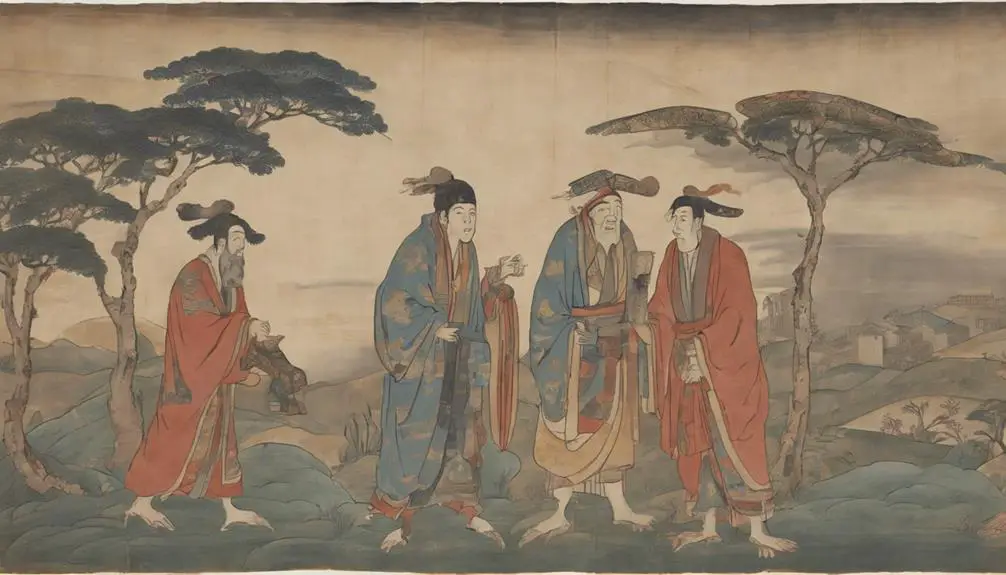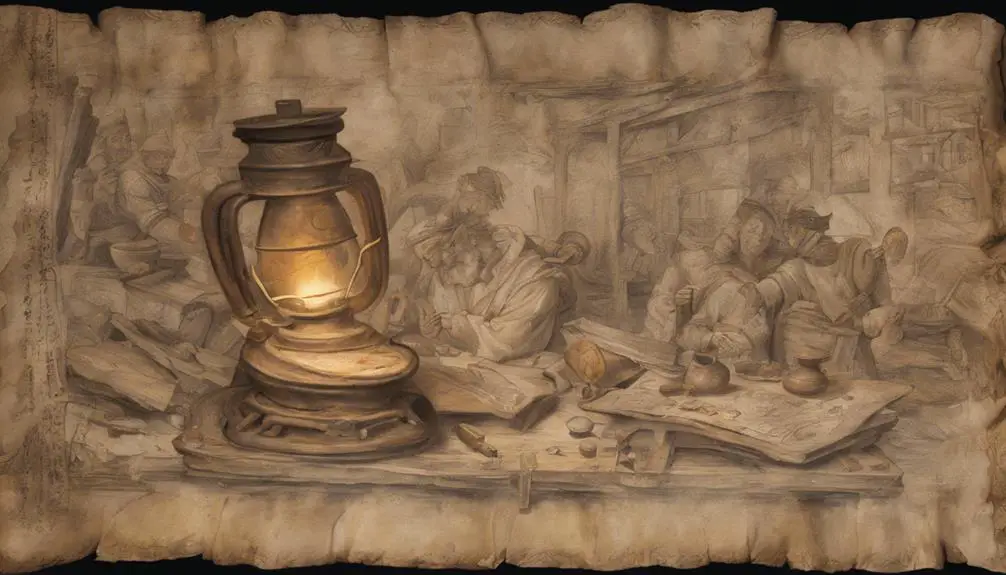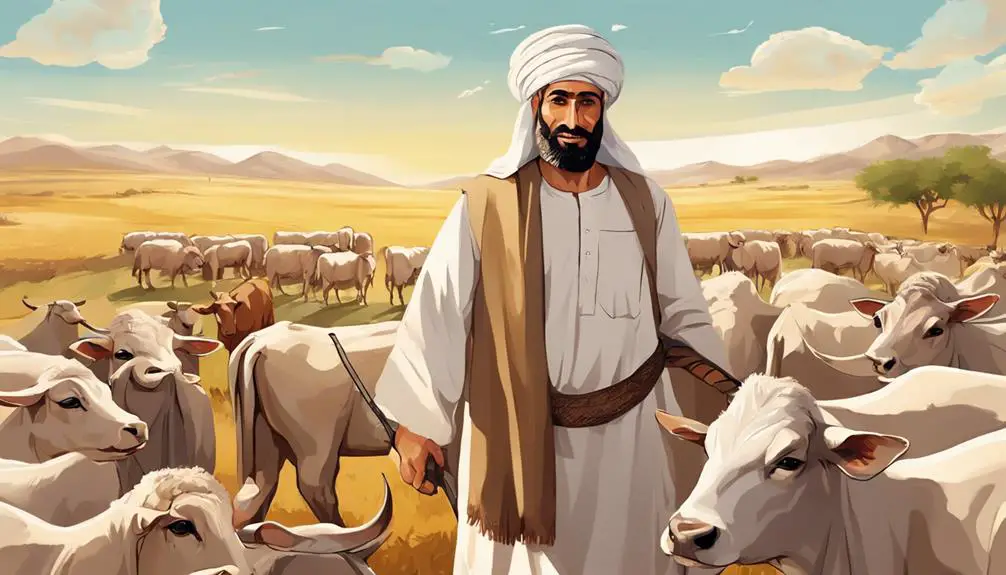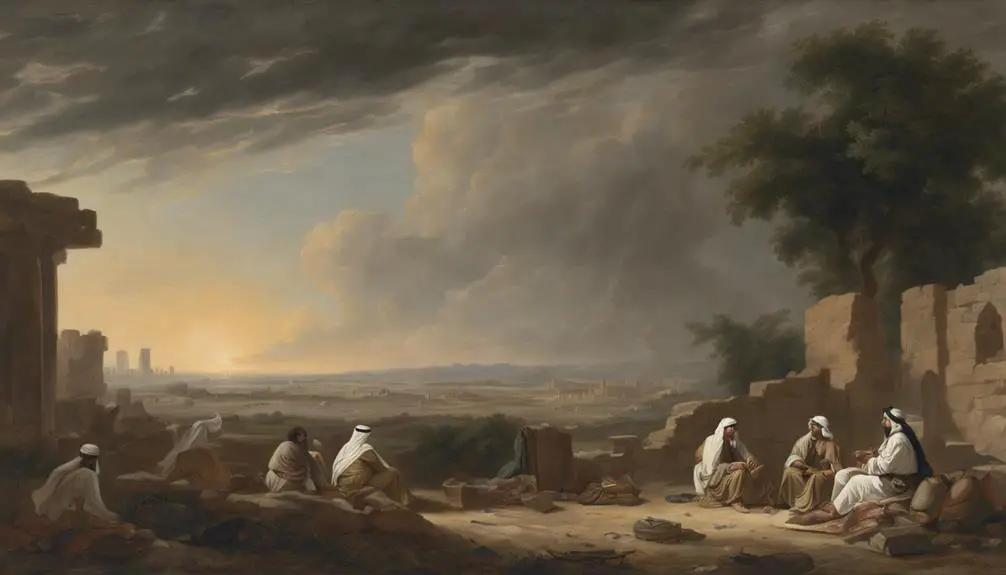Mining the depths of Job's trials in the Bible reveals profound insights on faith, suffering, and divine justice – a journey worth undertaking.

A Study of Job in the Bible
Like a miner chipping away at an enigmatic gem, you'll find the Book of Job in the Bible a compelling study. It's a narrative that explores human suffering, divine justice, and the complexity of faith under duress.
As you traverse through Job's trials and dialogues, you'll start to question and perhaps redefine your own understanding of divine wisdom.
So, are you ready to embark on this spiritual journey, unpacking the layers of Job's story, and discovering the profound insights it holds for your life today?
Key Takeaways
- Job's story demonstrates the importance of unwavering faith and resilience during adversity.
- The narrative challenges traditional views of suffering as punishment for sin.
- Job's dialogues with friends offer diverse perspectives on understanding and dealing with suffering.
- The story of Job reveals that divine justice is complex and often beyond human comprehension.
Historical Context of Job

To fully comprehend the story of Job, it's essential to first delve into its historical context, examining the societal norms, values, and beliefs of the era during which it was written. The Book of Job, part of the Bible's wisdom literature, has its roots in the ancient Near East, specifically within the patriarchal era. This period, spanning from 2000 to 1500 BC, was characterized by a hierarchical social structure, with a strong emphasis on familial relationships and tribal loyalty.
You must consider how the divine-human relationship was understood at this time. The prevailing belief was that prosperity was a blessing from the gods for righteous behavior, while adversity was a punishment for sin. This retributive justice system is a key theme in Job's narrative.
Furthermore, the concept of the afterlife wasn't as developed during this era. People strived for immortality through their descendants or by establishing a lasting name. Therefore, Job's initial loss of children and wealth isn't just a personal disaster, but a threat to his societal standing and legacy.
Knowing these historical nuances enables a deeper understanding of Job's trials and his ultimate vindication, providing context for the existential questions raised in the story.
Job's Initial Prosperity

Delving into Job's initial prosperity, you'll find him depicted as a man of exceptional wealth and piety, setting the stage for the dramatic losses and trials that are to follow. Job's prosperity is explicitly outlined in the beginning of his story, within the first chapter of the Book of Job.
Here, Job is described as "the greatest man among all the people of the East." His wealth is quantifiable, with 7,000 sheep, 3,000 camels, 500 yoke of oxen, 500 female donkeys, and a large number of servants. Importantly, this wealth isn't merely physical but also spiritual. Job was God-fearing, upright, and shunned evil, demonstrating his spiritual prosperity.
To gain a comprehensive understanding, let's map his prosperity in the following markdown table:
Possessions |
Quantity |
Significance |
|---|---|---|
Sheep |
7000 |
Wealth, Sacrifices |
Camels |
3000 |
Wealth, Transportation |
Oxen |
500 yoke |
Agriculture, Wealth |
Female donkeys |
500 |
Transportation, Wealth |
Each of these possessions had a specific purpose and added value to Job's life. They weren't just symbols of his wealth, but also tools that facilitated his prosperity. This balance between physical wealth and spiritual wealth is what defines Job's initial prosperity.
The Trial and Suffering of Job

In examining Job's trials and sufferings, you're plunged into an intricate tapestry of divine testing and human endurance, a stark shift from his initial prosperity. You observe a man of righteousness, stricken inexplicably with severe adversities. His trials begin with a heavenly challenge between God and Satan, with Job caught unwittingly in the middle.
In a rapid succession of calamities, you see Job losing his wealth, his children, and his health. Yet, he doesn't curse God as Satan anticipates. Instead, he responds with an astounding declaration of faith, 'The Lord gave, and the Lord has taken away; blessed be the name of the Lord.' This forms a significant part of Job's trial narrative, it's a testament to his remarkable resilience and unwavering faith amid agony.
Despite his resilience, Job's suffering intensifies. His body is inflicted with painful sores, and his spirit is burdened with confusion and despair. His wife suggests cursing God to die, but Job rebukes her, choosing to keep his integrity intact. Hence, you witness Job's struggle, not just with his physical pain, but also with his spiritual anguish. His ordeal underscores the theme of human suffering, faith, and perseverance.
Job's Dialogues With Friends

As you navigate through Job's ordeal, you'll encounter three of his friends – Eliphaz, Bildad, and Zophar – whose dialogues with him form a pivotal part of his narrative. Each friend offers a unique perspective on Job's suffering, reflecting different theological viewpoints.
Eliphaz, the Temanite, insists on traditional wisdom that suffering is punishment for sin. He's convinced that Job's trials must result from some hidden sin.
Bildad, the Shuhite, echoes similar sentiments, emphasizing the doctrine of retribution. He's harsher, suggesting that Job's children got what they deserved.
Zophar, the Naamathite, is perhaps the most condemnatory. He's adamant that Job's suffering isn't sufficient punishment for his sins. He urges Job to repent to alleviate his suffering.
Through these dialogues, Job's friends become the voice of conventional wisdom that intrinsically links suffering with sin. They're unable to comprehend that Job's suffering might be part of a larger divine plan. Their dialogues serve an essential function, providing a contrast to Job's faith and resilience. By engaging with their flawed arguments, Job's character is further illuminated, his integrity underscored, and his ultimate vindication made all the more significant.
Interpretation and Lessons From Job's Story

Moving forward from the poignant dialogues between Job and his friends, we find ourselves confronted with the task of interpreting the lessons embedded in Job's story. At its core, this narrative teaches us about faith, resilience, and divine justice.
Job's unwavering faith, even amid his suffering, is a profound lesson in steadfast devotion. You're reminded that faith isn't dependent on circumstances, it's a persistent resolve. His story prompts us to question: Do we remain faithful only when blessed, or can we maintain faith through trials?
Job's resilience demonstrates that human spirit is capable of enduring intense adversity. He didn't allow his suffering to destroy his spirit or faith. You can learn from Job's resilience by understanding that adversity isn't a reflection of your worth or faithfulness.
Lastly, the divine justice in Job's story illuminates God's sovereignty. God's response to Job's friends shows that human perspectives on righteousness and suffering are limited. You're urged to remember that divine wisdom surpasses human understanding; it isn't bound by our notions of fairness.
These lessons from Job's experience aren't meant to provide definitive answers, but to provoke deep reflection on faith, resilience, and divine wisdom.
Conclusion
In analyzing Job's story, you've explored deep themes of faith, suffering, and divine justice. You've seen Job's prosperity, his trials, and his dialogues.
The lessons derived, such as enduring faith in adversity and the mystery of divine will, are profound. It's clear that Job's story continues to resonate, offering timeless insights on the human experience and the nature of God.
Remember, the Book of Job isn't just a tale, it's an invitation to delve deeper into our understanding of faith.



Sign up